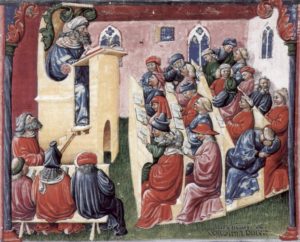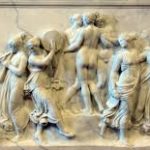Ancient Roman Education System: Education in the Roman Empire was focused on teaching students critical skills that could be directly applied to everyday life.

An education should, in the classical Roman view, be valued not only for what it could teach the student about thinking, but also how it could teach the student about living, and, more importantly, how it could teach the student to contribute to society.
Ancient Roman Education System
According to the ancient Roman culture, a child’s education, physical and moral, began at home under the strict supervision of his or her parents. The ancient Roman education aimed at transforming a child into a strong, healthy, religious and responsible citizen.
In early Roman days, a Roman boy’s education took place at home. If his father could read and write, he taught his son to do the same. The father instructed his sons in Roman law, history, customs, and physical training, to prepare for war. Reverence for the gods, respect for law, obedience to authority, and truthfulness were the most important lessons to be taught.
Roman Schools
A Roman school, whether private or public, would often be nothing more than a one-man operation in a single room or even in a shop booth in the marketplace. Teachers were overworked and underpaid, putting in long hours for the same wages as the least skilled artisans and manual laborers.

There are recorded complaints that their income was often less than two-thirds of what they needed to support a family. They didn’t starve, however just went on the dole like any other underpaid workers.
Important Subjects to Learned
The first and most important subjects learned were reading, writing, and arithmetic. The children first learned the letters of the written Greek alphabet, a fully phonetic script which was a Greek invention. They learned to form the letters, and eventually how to form sentences from dictation.

The school day began before sunrise, as did all work in Rome. Kids brought candles to use until daybreak. There was a rest for lunch and the afternoon siesta, and then back to school until late afternoon. No one knows how long the school year actually was; it probably varied from school to school.
Ancient Roman Education System: Facts
Alumni would start off by learning the twenty-four letters of the alphabet. When they had come to learn to read it would be frequent for them to learn the famous laws of the twelve tablets (the first written laws of Rome collated by the Decemviri).
After the grammar school, the student would move on to learn the art of Oratory to speak in public. This was between the ages of 16 and 18. Public speaking was essential if one aspired to any form of public career. The study of Oratory was subdivided into three principal disciplines: Translation, Declaiming and Reciting.



